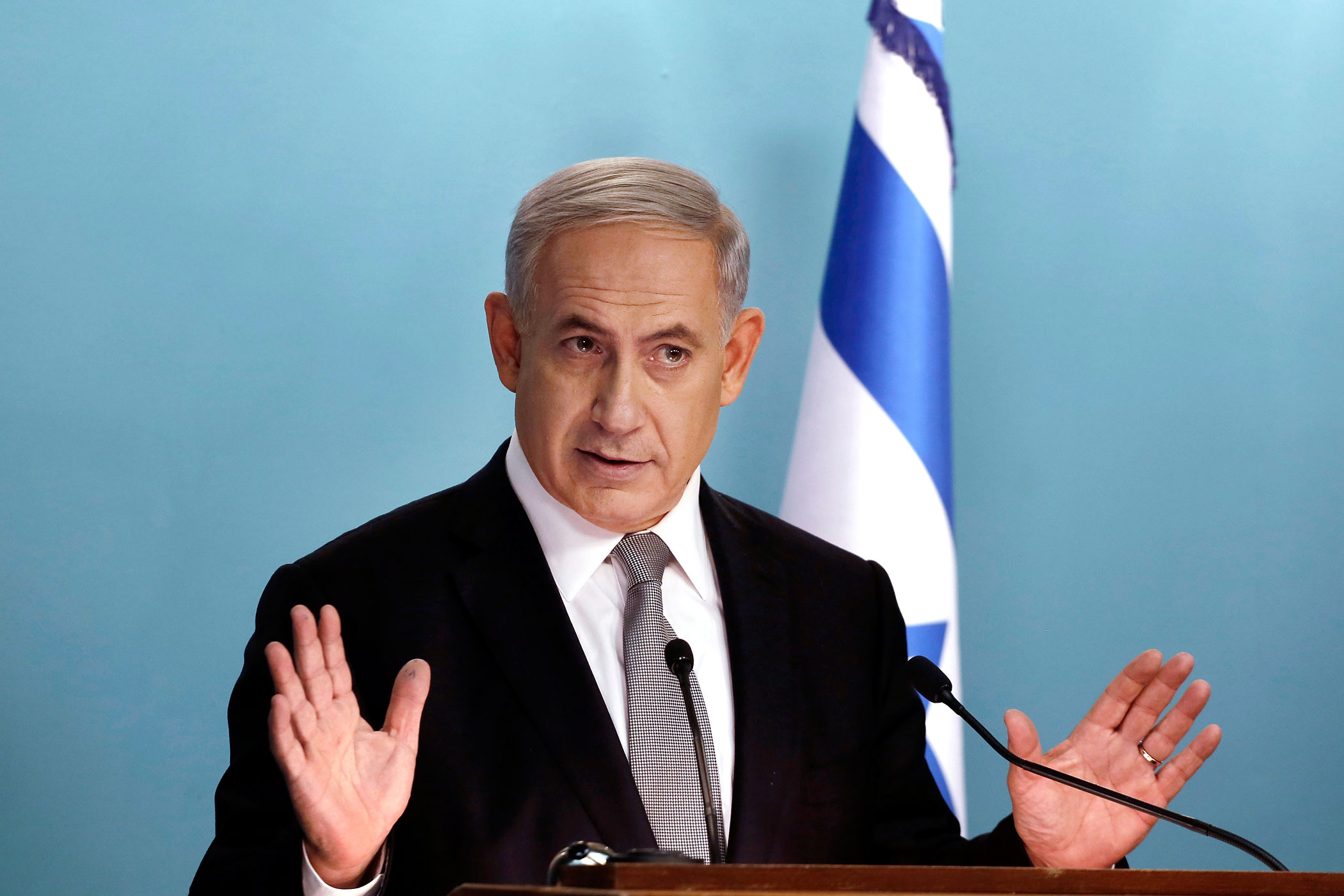
Israeli Prime Minister Benjamin Netanyahu fired two of his most prominent ministers on Tuesday evening and called for new elections, underscoring his interest in establishing a right-wing government more loyal to his agenda.
The three-term premier announced at a press conference Tuesday that he was ousting Justice Minister Tzipi Livni and Finance Minister Yair Lapid, accusing them of openly rebelling against him and preventing him from governing the country. Livni joined Netanyahu’s government on the condition that he allow her to renew peace talks with the Palestinians, and Lapid had promised to take on socioeconomic reforms and Israel’s housing crisis.
“You can call it a putsch, and like this you can’t govern and can’t run a country,” Netanyahu said in a prime-time press conference. “I will not agree to a situation in which ministers attack the government from within.” Speaking as if he was simultaneously launching a new campaign, he urged voters to give him a “bigger ruling party” – the right-wing Likud – adding, “if you want a government of the center-right and right, then I ask to give you your vote to us.”
Over the past week, Israeli media had begun to predict that the bad blood inside Netanyahu’s coalition government had reached toxic new levels, and that it has pushed the hawkish leader to opt for new elections. The most recent bone of contention was a plan on the part of Lapid and his Yesh Atid party to cancel a tax on apartment purchases for first-time home buyers as a way to alleviate the cost-of-living crisis that Lapid had pledged to solve.
But Netanyahu decided to block that with little explanation, as well as a health-care reform plan, which in turn led Lapid to threaten to bolt the coalition. In his speech, Netanyahu condemned Livni for daring to meet with Palestinian President Mahmoud Abbas when she had been told not to, highlighting their differences over the failure of the peace talks in April.
The most severe division, however, was over the question of Israel’s status – or not—as a Jewish nation. Together, Lapid and Livni were among the foremost opponents to the passage by Netanyahu’s cabinet of an initial draft of a controversial bill declaring Israel a nation state. Netanyahu says he is dedicated to passing some version of this legislation so as to cement Israel’s status as a Jewish state by law, which he argues is necessary for the country’s survival. Critics say this would create an undemocratic two-tier system which makes Israeli Arabs and other non-Jewish minorities inferior citizens.
“You could say that it’s the straw that broke the camel’s back,” Gadi Wolfsfeld, a political scientist at the IDC Herzliya, a university near Tel Aviv, tells TIME. “I take him at his word. He can’t really govern, he can’t really get legislation passed. He is not a leader right now, in that he can’t run the country as he would like to. Netanyahu didn’t want this government in the first place, and he prefers what he calls, his ‘natural allies.’”
Those allies are the ultra-Orthodox parties, United Torah Judaism and Shas. These are parties which have been willing to join coalitions in left and right-leaning governments, because their main goals are to protect their religious way of life and to secure funding for schools and other ultra-Orthodox institutions. But with secular-religious tensions on the rise, Lapid promised to push back against the control of the ultra-Orthodox over issues like marriage rights, and to pass a new draft law requiring men from religious communities to serve in the army, overturning an exemption in existence since the founding of the state.
Netanyahu appears to be banking on Likud continuing to garner the most votes – polls have found that would be the case if elections were held today – and that he can then team up with these ultra-Orthodox parties, as well as the nationalist parties led by right-wingers Naftali Bennett (Habayit Hayehudi, or the Jewish House) and Avigdor Lieberman (Yisrael Beytenu, or Israel is Our Home).
Israel’s political shake-up takes places against a backdrop of complete stagnation in the Israeli-Palestinian political process and a wave of violence that has been labeled by some as the stirrings of a new intifada, or Palestinian uprising. But the months ahead of yet-to-be-determined Israeli elections – several Israeli media outlets suggested the date would be in March – mean that Netanyahu now has a period in which he can tell various foreign leaders that peace will have to wait.
“One of the great things about elections is that it gets the world off his back,” Wolfsfeld quips. “No one will be able to say, what about the peace process, because he can say, ‘I’m sorry, I’m busy having elections now.’” If violence and unrest in Jerusalem and the West Bank continues, it will likely push more voters into Netanyahu’s camp, because he has positioned himself as the Israeli leader who is tough on terrorism. “The more there’s violence,” says Wolfsfeld, “the more his party’s strength will go up.”
More Must-Reads from TIME
- Donald Trump Is TIME's 2024 Person of the Year
- Why We Chose Trump as Person of the Year
- Is Intermittent Fasting Good or Bad for You?
- The 100 Must-Read Books of 2024
- The 20 Best Christmas TV Episodes
- Column: If Optimism Feels Ridiculous Now, Try Hope
- The Future of Climate Action Is Trade Policy
- Merle Bombardieri Is Helping People Make the Baby Decision
Contact us at letters@time.com